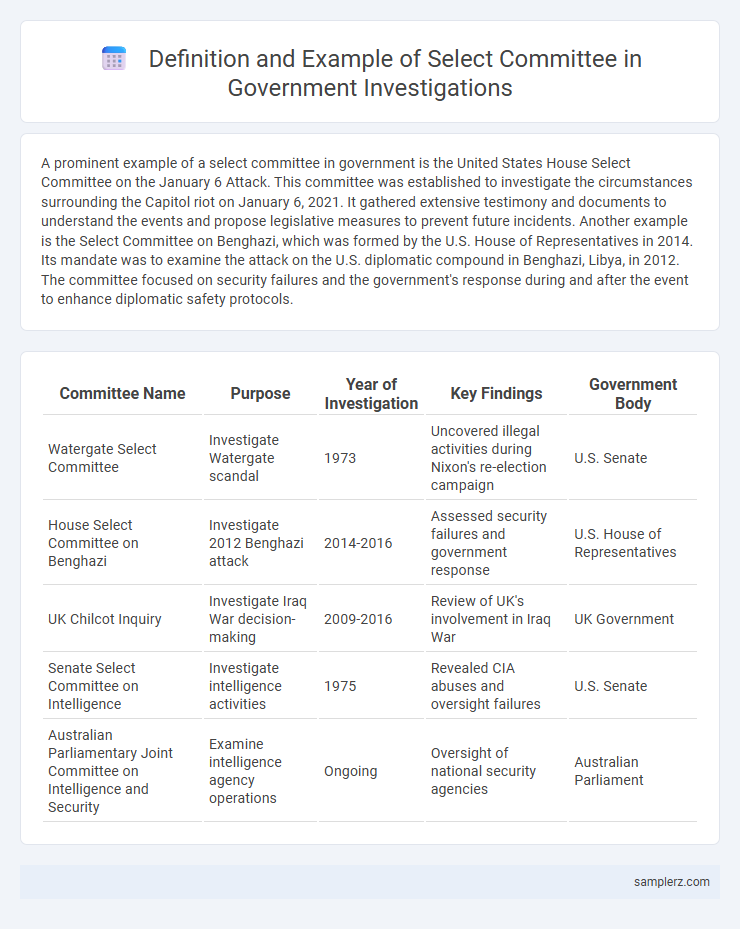A prominent example of a select committee in government is the United States House Select Committee on the January 6 Attack. This committee was established to investigate the circumstances surrounding the Capitol riot on January 6, 2021. It gathered extensive testimony and documents to understand the events and propose legislative measures to prevent future incidents. Another example is the Select Committee on Benghazi, which was formed by the U.S. House of Representatives in 2014. Its mandate was to examine the attack on the U.S. diplomatic compound in Benghazi, Libya, in 2012. The committee focused on security failures and the government's response during and after the event to enhance diplomatic safety protocols.
Table of Comparison
| Committee Name | Purpose | Year of Investigation | Key Findings | Government Body |
|---|---|---|---|---|
| Watergate Select Committee | Investigate Watergate scandal | 1973 | Uncovered illegal activities during Nixon's re-election campaign | U.S. Senate |
| House Select Committee on Benghazi | Investigate 2012 Benghazi attack | 2014-2016 | Assessed security failures and government response | U.S. House of Representatives |
| UK Chilcot Inquiry | Investigate Iraq War decision-making | 2009-2016 | Review of UK's involvement in Iraq War | UK Government |
| Senate Select Committee on Intelligence | Investigate intelligence activities | 1975 | Revealed CIA abuses and oversight failures | U.S. Senate |
| Australian Parliamentary Joint Committee on Intelligence and Security | Examine intelligence agency operations | Ongoing | Oversight of national security agencies | Australian Parliament |
Introduction to Select Committees in Government Investigations
Select committees, such as the UK Parliament's Home Affairs Select Committee, play a crucial role in government investigations by scrutinizing policies and administration within specific departments. These committees gather evidence, question witnesses, and produce reports that influence legislative changes and public accountability. Their targeted inquiries enhance transparency and ensure government actions align with public interest and statutory requirements.
Role of Select Committees in Parliamentary Oversight
Select committees such as the UK Parliament's Public Accounts Committee play a critical role in parliamentary oversight by scrutinizing government expenditures and ensuring accountability in public spending. These committees conduct detailed investigations into government policies, departmental performance, and the implementation of laws, helping to identify inefficiencies and recommend improvements. Their work enhances transparency and strengthens democratic governance by holding the executive branch accountable to the legislature.
Historical Examples of Select Committee Investigations
The Watergate scandal is a prominent historical example where the Senate Select Committee on Presidential Campaign Activities played a crucial role in uncovering political corruption in the 1970s. Another significant case includes the House Select Committee on Assassinations, established in the late 1970s to investigate the deaths of John F. Kennedy and Martin Luther King Jr., utilizing forensic and acoustic analysis to reexamine evidence. These committees exemplify the power of select committees to conduct thorough investigations and influence governmental transparency and accountability.
Structure and Formation of Select Committees
Select committees in government are formed by parliamentary resolutions, with members nominated by political parties proportional to their representation in the legislature. These committees operate with a defined structure, typically including a chairperson, standing members, and support staff, ensuring focused investigation into specific matters such as public administration or financial oversight. For example, the UK Parliament's Public Accounts Committee examines government expenditures, facilitated by its structured membership and clear procedural rules.
Major Select Committee Inquiry: Watergate Scandal
The Major Select Committee Inquiry into the Watergate Scandal exemplifies the role of select committees in government investigations, uncovering abuses of power within the Nixon administration. This committee's rigorous examination of evidence and witness testimonies was pivotal in exposing the break-in and subsequent cover-up that led to President Nixon's resignation. The Watergate investigation established a precedent for congressional oversight and reinforced the importance of select committees in maintaining government accountability.
The Benghazi Select Committee Investigation
The Benghazi Select Committee Investigation was a focused congressional inquiry established in 2014 to examine the 2012 attack on the U.S. diplomatic compound in Benghazi, Libya, which resulted in four American deaths. This select committee analyzed security failures, intelligence assessments, and government response, producing detailed reports on the incident. Its work highlighted accountability issues within the State Department and intelligence agencies during and after the attack.
COVID-19 Response: Select Committee Oversight
The Select Committee on the COVID-19 Response was established to conduct thorough oversight of the government's handling of the pandemic, scrutinizing public health measures, vaccine distribution, and emergency funding allocation. This committee examined the effectiveness of testing protocols, contact tracing efforts, and communication strategies implemented during the crisis. Its investigations provided critical recommendations to enhance transparency and accountability in future public health emergencies.
Impact of Select Committees on Policy and Reform
Select committees such as the UK Parliament's Public Accounts Committee play a crucial role in scrutinizing government expenditure and holding departments accountable, directly influencing fiscal policy and public sector reform. Their detailed investigations into areas like healthcare funding and education standards often lead to significant legislative changes and improved governance practices. Evidence-based recommendations from these committees drive transparency and enhance policy effectiveness across multiple government sectors.
Challenges Faced by Select Committees in Investigations
Select committees such as the UK Parliament's Home Affairs Select Committee face challenges including limited resources, restricted access to classified information, and political pressures that can hinder impartial investigations. These constraints often delay report submissions and reduce the effectiveness of oversight functions. Ensuring transparency while protecting sensitive data remains a critical balance in maintaining public trust during government inquiries.
The Future of Select Committees in Government Accountability
Select committees such as the UK's Public Accounts Committee exemplify effective government investigation by scrutinizing public expenditure and ensuring transparency. These committees play a pivotal role in holding the executive accountable through detailed inquiries and reports. Strengthening the future of select committees involves enhancing their powers, resources, and independence to improve government accountability and public trust.

example of select committee in investigation Infographic
 samplerz.com
samplerz.com